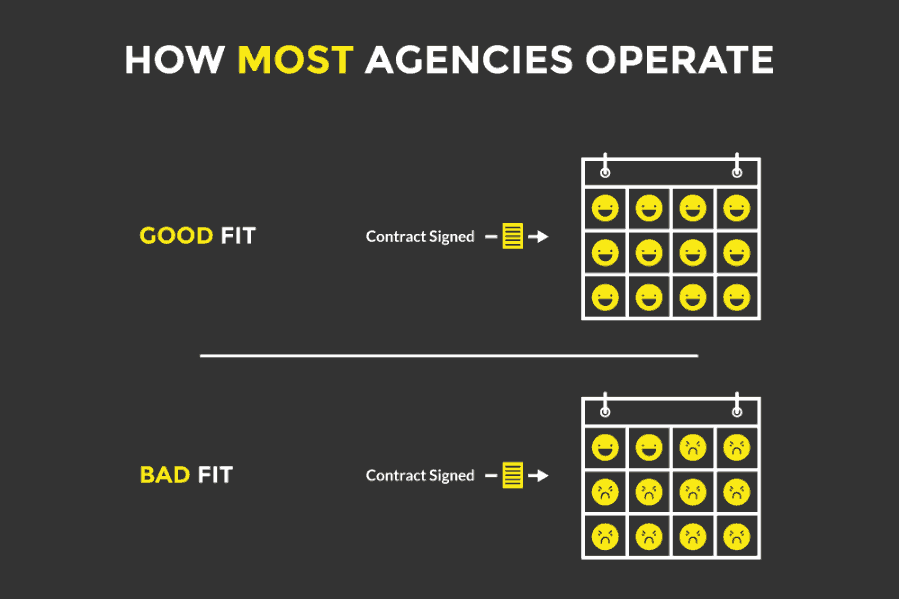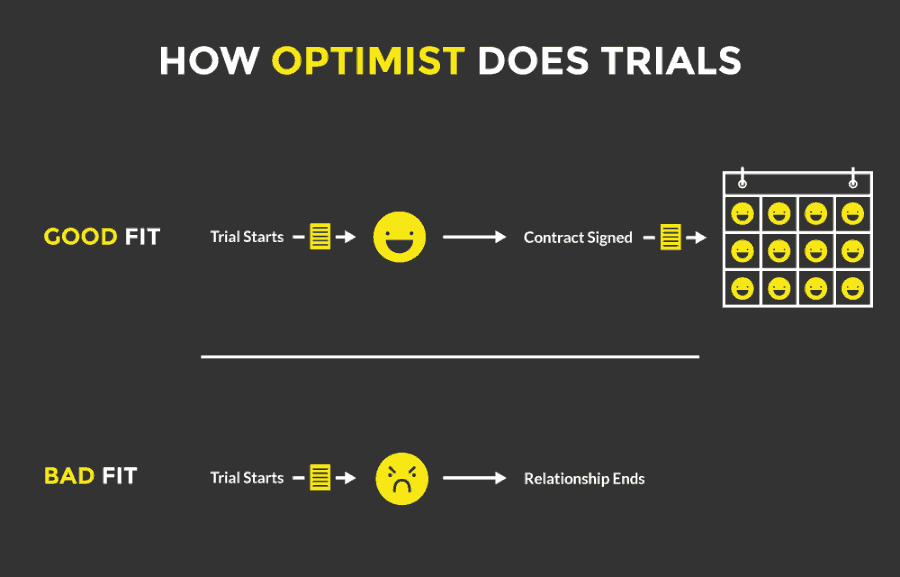Between looking at various tools for our own use and checking out sites from companies that we’d like to work with or would like to work with us, it’s safe to say that I’ve seen hundreds, or even thousands, of them.
There’s one thing that almost every SaaS website has in common. It’s so obvious and ubiquitous that you may just take it for granted at this point–it’s something you just assume is there and then forget about it (unless it’s not).

Groove’s website
Almost every SaaS website offers a free trial.
It’s pretty much industry standard–and it makes total sense why SaaS companies almost universally let buyers try their product out first.
A free trial offer helps the SaaS company because they can build a pipeline of prospective buyers and get them to try their service with no risk. And it’s almost a nonstarter these days for customers. Even though the risk is relatively low, people are still super hesitant to whip out their credit card and buy a product that they’ve never used or, in some cases, even seen.
So why don’t other industries have trial offers?
I can’t speak for the every industry, but from the perspective of an agency, this seems like a big oversight and one that’s likely rooted in a lot of fear and mismanaged expectations.
How agencies (usually) work
In many cases, agencies are talking about having clients sign contracts for somewhere between $1,000 and $100,000 (or more). Often times, they’re on a monthly basis. And sometimes they even lock in clients for a contractually mandated minimum number of months (or years!)
And they expect clients to sign on for these deals–in most cases–without having ever actually worked with the agency. They expect customers to buy without trying.
It just doesn’t make sense for any company–especially a startup–to shell out money to hire an agency without ever working with them. In most cases, an agency won’t even provide a basic outline of the strategy or plan without getting paid first (which is fine).

To put it simply: This is a busted-ass model.
It’s rooted in the idea that agencies want to try to stabilize their cash flow and workload and also mitigate some of their risk and cost associated with onboarding new clients. That makes sense, to a point. But, they’re shifting the burden onto the client without providing any sort of reason why the client should have to bear it.
Unfortunately, it’s often a case of mismanaged expectations. Agencies sign new clients with massive promises for over-the-moon results without having to worry if they can actually deliver–because the contract says they’re signed on for 12 months either way.
It just doesn’t seem fair or smart for an agency to operate this way. We wanted our agency to put expectations and fit above all else. We wanted to focus on finding the best clients for us and to partner with companies that are looking for the exact kind of work we can provide.
So, we’ve decided to start offering trials (not free ones, sorry).
And we made them mandatory.
How our trials work
As part of our policy, every prospective client will work with us on a paid trial project before signing on for a monthly retainer.
Whenever we have an inquiry from a new client who wants to work with us–even if they’re ready to sign a contract on a full monthly retainer–we do a trial first. If we reach out to a potential client about working together, we propose a trial project to try things out.

The trial is a bit different for each client, but essentially, it boils down to a one-off, flat-fee project with a specific scope. Generally, it takes somewhere between 1 to 3 weeks from the kickoff of the trial through to the actual completion.
In that time period, we get a chance to work together, see if there’s a fit, and get to know each other on a professional (and sometimes personal) level.
It helps us focus on long-term health of the company
Let’s be clear: We’re a startup. We’ve been around for just a few months.
And like most startups, we’re cash strapped and hungry for revenue.
So, why would we postpone a contract in hand in order to do a trial project first? Because it forces us to find the right people to work with and to evaluate the potential for a sustained relationship with each client.
Taking on work with the wrong partners jeopardizes the long-term stability of our company. For an agency, losing a client is much more painful than simply not signing a new one. It means cutting work for your team, tightening the belt, and possibly reorganizing your entire company.
We want clients that we can work with for a long time, so we need to focus on building and fostering those relationships while weeding out the ones that aren’t right, even if it means giving up some marginal revenue in the short term.
While other agencies try to mitigate this risk by locking in clients, that really just seems like a shitty way to fix a broken system. It’s masking the symptom but doing nothing to fix the root problem (clients aren’t the right fit or don’t have the right expectations).
Not only does it allow us to focus our time and effort more strategically, but it gives our clients a better picture of what they can expect from working with us.
Our clients get to see if we’re the right fit
Different companies need and expect different things from a content marketing agency. We know that we can’t be everything to everyone.
It’s easy for us to try to communicate how we work and what we deliver through our website, proposals, and in discovery conversations. But until a client actually works with us, it can be difficult to really get a feel for how we get things done and the level of work that we do.
Trials solve for that problem.
Clients can get a good look at the work we do, how long it takes us to get up and running, the quality of what we produce, and any other factor that will be important in long-term relationships.
As someone who has hired agencies in the past, this kind of first-hand experience working with someone is really the first time you get a feel for how things will actually go. Sometimes your expectations are met. Other times they’re not. We try to reduce the likelihood of any surprises for the client.
But these trials aren’t entirely altruistic. It also helps Optimist in a big way, too.
We save ourselves from shitty clients
There’s no point in beating around the bush. Trials are important because they help us avoid entering into relationships with clients that don’t jive with our culture.
They may be overly demanding, difficult to work with, or just have the wrong expectations about what we can and will deliver. Whatever the case is, doing a trial project before signing a long-term agreement helps us mitigate the risk that we enter into a working relationship with a client that just isn’t a good fit for us.
Anyone who has worked at or run an agency probably knows the pain of having a client that’s not a good fit. Everyone knows it. But, usually, nothing happens as long as the client keeps paying their bills. There’s a constant, low-level anxiety that today will be the day the other shoe drops and the client decides to fire you–finally.
It’s weird because you almost start to hope it happens. That is obviously not the feeling you want to become pervasive within your company. And it’s definitely not fun.
We’d prefer to avoid as much existential dread as possible, thank you.
Our service contracts don’t lock clients into a certain timeframe. So, even if we did get in with a bad client, we wouldn’t be legally forced to work with them. But this extra level of protection gives us the opportunity to test out how we like working with them just as it helps them test us in the same way.
All in all, I think our mandatory trials have allowed us to grow more strategically and with the right partners, even if a bit slower than we otherwise would have. It’s been a healthy part of our process and allowed us to both assuage the fears of some potential clients and also satisfy our own need to further qualify and validate the relationship.
I owe it all to the SaaS industry for reminding me that sometimes it’s better to build a relationship rather than go straight for the sale.
Follow along as we grow a $1,000,000 agency from scratch
Sign up for updates from our agency journal. We’ll never send you spam or BS.